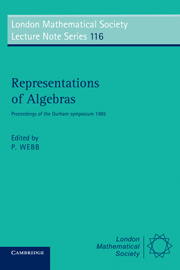Book contents
- Frontmatter
- Contents
- Introduction
- Representation theory of finite-dimensional algebras
- A survey of existence theorems for almost split sequences
- Representations of posets and tame matrix problems
- Geometry of representations of quivers
- Cohen-Macaulay modules on hypersurface singularities
- Almost split sequences and algebraic geometry
- Representation rings of finite groups
Almost split sequences and algebraic geometry
Published online by Cambridge University Press: 01 March 2011
- Frontmatter
- Contents
- Introduction
- Representation theory of finite-dimensional algebras
- A survey of existence theorems for almost split sequences
- Representations of posets and tame matrix problems
- Geometry of representations of quivers
- Cohen-Macaulay modules on hypersurface singularities
- Almost split sequences and algebraic geometry
- Representation rings of finite groups
Summary
Our main purpose in this paper is to explore some instances of almost split sequences occuring in algebraic geometry. We will be dealing mainly with three topics:
(1) The connections between the structure of the almost split sequences for reflexive modules over rational double points and the desingularization graph of the singularity;
(2) The existence of almost split sequences for coherent sheaves over nonsinguiar and Gorenstein projective curves;
(3) The question of which complete integrally closed Cohen-Macaulay local domains are of finite Cohen-Macaulay type, i.e. have, up to isomorphism only a finite number of indecomposable Cohen-Macaulay modules.
This paper is almost a verbatim account of the last two lectures I gave at the Durham symposium on the representation theory of algebras. Since these lectures were purely expository, no proofs are given.
§1. Complete rational double points.
Throughout this section k is an algebraically closed field. We recall that the complete rational double points over k can be described as follows. Let k[[u,v,w]] be the ring of formal power series in three variables u, v, w. Then the complete rational double points over k are k-algebras R of the form k[[u,v,w]]/(f(u,v,w)) with f(u,v,w) a 166 non-zero element in the maximal ideal (u,v,w) of k[[u,v,w]] such that R is an integrally closed domain with a finite class group.
- Type
- Chapter
- Information
- Representations of AlgebrasProceedings of the Durham Symposium 1985, pp. 165 - 180Publisher: Cambridge University PressPrint publication year: 1986
- 2
- Cited by

